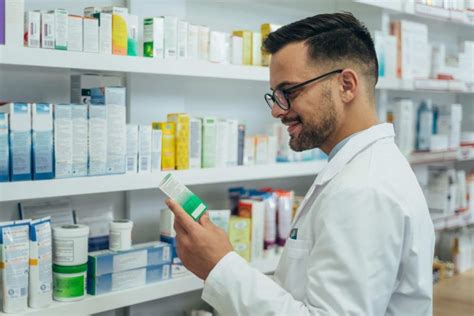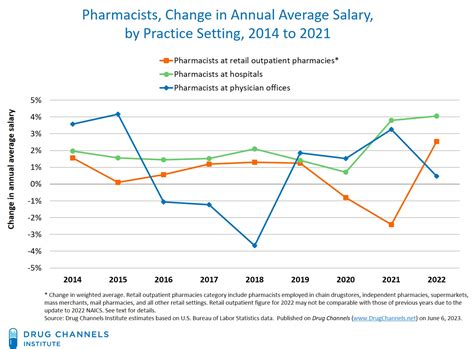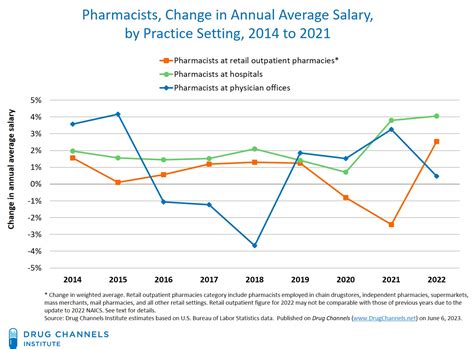For many pharmacy professionals and students, the path of an industry pharmacist represents a frontier of innovation, impact, and significant financial reward. Moving beyond traditional patient-facing roles, these experts work at the heart of drug discovery, development, and commercialization. But what does that translate to in terms of compensation?
A career as an industry pharmacist is one of the most lucrative paths for a Doctor of Pharmacy (Pharm.D.) graduate, with average salaries frequently exceeding $150,000 and senior-level professionals earning well over $200,000 annually. This guide will provide a data-driven look at what you can expect to earn and the key factors that will shape your salary throughout your career.
What Does an Industry Pharmacist Do?

Before diving into the numbers, it's essential to understand the scope of this dynamic role. Unlike retail or hospital pharmacists, industry pharmacists work for pharmaceutical, biotechnology, or medical device companies. They are integral to the entire lifecycle of a drug or medical product.
Their responsibilities are diverse and can include:
- Clinical Development: Designing and managing clinical trials to test the safety and efficacy of new drugs.
- Medical Affairs: Acting as scientific experts, communicating complex data to physicians and key opinion leaders. A popular role in this area is the Medical Science Liaison (MSL).
- Regulatory Affairs: Navigating the complex process of getting a drug approved by government agencies like the FDA.
- Pharmacovigilance: Monitoring and reporting on the safety of drugs once they are on the market.
- Marketing and Commercialization: Providing clinical expertise to marketing teams to ensure promotional materials are accurate and effective.
This career path trades direct patient interaction for a role that can influence the health of millions of patients at once.
Average Industry Pharmacist Salary

While salaries vary widely, the earning potential in the pharmaceutical industry is substantially higher than in most other pharmacy sectors.
- Average Base Salary: According to data from salary aggregators like Salary.com, the median annual salary for an industry-based pharmacist is approximately $155,830 as of late 2023, with a typical range falling between $145,190 and $167,590.
- Total Compensation: It's crucial to look beyond base salary. As noted by Glassdoor, total compensation for roles like Medical Science Liaison often includes significant bonuses, stock options, and other incentives, which can add $20,000 to $40,000+ to the annual take-home pay.
For context, this is considerably higher than the median pay for all pharmacists. The U.S. Bureau of Labor Statistics (BLS) reports a median annual wage of $134,790 for pharmacists in May 2023. The premium paid to industry pharmacists reflects the specialized skills, business acumen, and direct impact on a company's product pipeline and revenue.
Key Factors That Influence Salary

Your specific salary as an industry pharmacist is not a single number but a reflection of several key variables. Understanding these factors is crucial for maximizing your earning potential.
###
Level of Education
While a Doctor of Pharmacy (Pharm.D.) is the standard entry-level degree, additional qualifications can significantly increase your salary and career trajectory.
- Post-Graduate Fellowships: A one- or two-year industry fellowship is the most common and effective way to enter the field. It provides hands-on experience and networking opportunities. While fellows earn a stipend (typically $50,000 - $70,000), they command much higher starting salaries upon completion.
- Dual Degrees: A Pharm.D. paired with an MBA (Master of Business Administration) is highly valuable for commercial, marketing, or corporate strategy roles. A MPH (Master of Public Health) or a Ph.D. can be advantageous for roles in epidemiology, health economics, and early-stage research.
###
Years of Experience
Experience is arguably the most significant driver of salary growth in the pharmaceutical industry. The career ladder provides clear and substantial financial rewards at each step.
- Entry-Level (0-2 years): Professionals coming out of a fellowship or with minimal experience can expect to start in roles like Associate Manager or Medical Science Liaison. Salaries typically range from $110,000 to $145,000.
- Mid-Career (3-8 years): With several years of experience, pharmacists move into Manager or Senior Manager roles. In this phase, salaries often climb to $150,000 to $190,000, accompanied by larger annual bonuses.
- Senior/Executive Level (8+ years): At the Director, Senior Director, or Vice President level, compensation becomes highly competitive. Base salaries frequently exceed $200,000, and total compensation, including substantial stock awards and performance bonuses, can reach $250,000 to $400,000+.
###
Geographic Location
As with most professions, where you work matters. Salaries are highest in major pharmaceutical and biotech hubs where the demand for talent is fierce and the cost of living is higher.
Key high-paying regions include:
- Boston/Cambridge, MA
- San Francisco Bay Area, CA
- San Diego, CA
- New Jersey / New York City Metro Area
- Raleigh-Durham (Research Triangle Park), NC
Salaries in these hubs can be 15-25% higher than the national average to account for competition and living costs.
###
Company Type
The size and type of the company you work for also play a role in your compensation structure.
- Large Pharmaceutical Companies ("Big Pharma"): Companies like Pfizer, Johnson & Johnson, and Merck typically offer high base salaries, robust benefits packages, and structured bonus programs. The path for advancement is well-defined.
- Biotechnology Startups: A smaller biotech company may offer a slightly lower base salary but compensate with significant equity or stock options. This is a higher-risk, higher-reward scenario, as the value of the stock could multiply if the company succeeds.
- Contract Research Organizations (CROs): CROs work on behalf of pharmaceutical companies to manage clinical trials and other functions. According to Payscale, salaries at CROs are competitive but may be slightly lower than at a sponsor company, though they offer excellent experience across multiple therapeutic areas.
###
Area of Specialization
Within the industry, some functional areas are more lucrative than others due to the specific expertise required and their direct link to a product's success.
- Medical Affairs (e.g., Medical Science Liaison - MSL): This is consistently one of the highest-paying non-executive roles. The combination of deep scientific knowledge, communication skills, and travel requirements commands premium pay, often starting at $140,000+ and rising quickly.
- Regulatory Affairs & Health Economics (HEOR): Professionals who can successfully navigate FDA regulations or demonstrate a drug's economic value to payers are in high demand. Senior roles in these departments are extremely well-compensated.
- Clinical Development & Clinical Research: Pharmacists managing pivotal clinical trials have a direct impact on a drug's approval and success, leading to strong salaries.
- Pharmacovigilance & Medical Information: These roles are vital for patient safety and physician support. While compensation is excellent, it may start slightly lower than in a commercial-facing MSL role but offers a strong, stable career path.
Job Outlook

The U.S. Bureau of Labor Statistics projects a 3% growth for all pharmacist jobs from 2022 to 2032. However, this overall figure masks the nuances of the market. While the growth in traditional retail roles may be slowing, the outlook for pharmacists in the industry sector remains very strong.
The continuous pipeline of new, complex therapies (like cell and gene therapies), an aging population, and an increasingly complex global regulatory environment will fuel sustained demand for pharmacists with specialized industry skills for years to come.
Conclusion

A career as an industry pharmacist is a challenging, intellectually stimulating, and financially rewarding path. While the average salary is impressive, your ultimate earning potential is in your hands.
Key Takeaways:
- High Earning Potential: Expect a starting salary well above the general pharmacist average, with a clear path to earning over $200,000 with experience.
- Experience is King: Your salary will grow significantly as you move from entry-level to senior leadership roles.
- Specialization Matters: Roles in Medical Affairs (MSL), Regulatory Affairs, and HEOR are often among the highest paid.
- Location Pays: Working in a major biotech hub like Boston or San Francisco will command a higher salary.
- Go Beyond the Degree: Pursuing a post-graduate fellowship is the single best investment you can make to launch a successful and lucrative industry career.
For any Pharm.D. professional looking to leverage their clinical expertise on a global scale, the pharmaceutical industry offers a career of immense impact and unparalleled financial opportunity.
